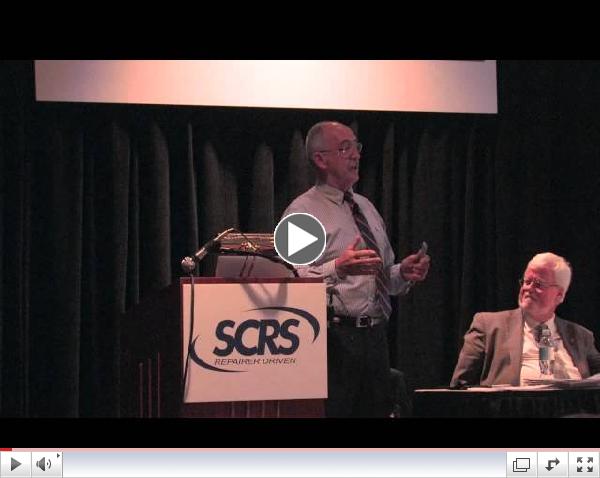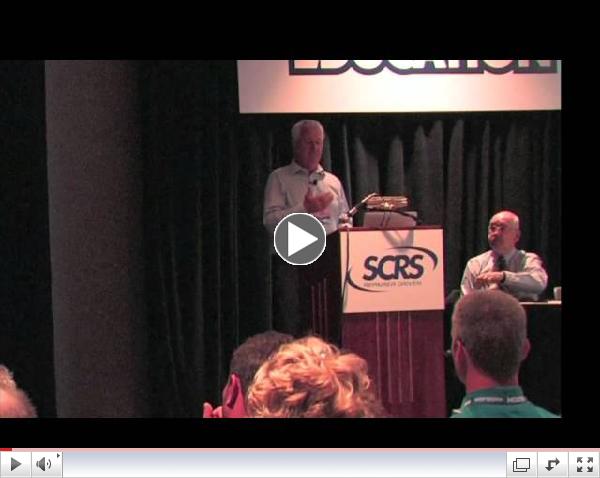 FOR IMMEDIATE RELEASE FOR IMMEDIATE RELEASE
For Further Information:
Aaron Schulenburg, SCRS Executive Director
Phone: (302) 423-3537 or Email: aaron@scrs.com
SCRS Releases Video Coverage of International Perspective on Insurer-Mandated Parts Procurement From SEMA RDE Session at SEMA highlights the impact these programs have had on global markets in Australia, New Zealand and Canada. Prosser, Washington, February 4, 2013 - A central topic of collision repair discussion this year has been the advent of the insurer-mandated parts procurement program, of which State Farm's controversial PartsTrader pilot in select cities across the United States has garnered the most visibility to date. While the effects of these programs have yet to fully play out in the U.S., their nature as a mandated intrusion into established business processes may well cause long-term harm to collision repairers and suppliers. In November of 2012 at the SEMA Show, The Society of Collision Repair Specialists (SCRS) brought together a panel of guests from around the world that have first-hand experience with insurer-mandated parts procurement in their respective countries. The program, part of SCRS' Repairer Driven Education (RDE) curriculum, was titled, "Bidding Wars: A Global View on the Possible Economic Impact of Insurer Involvement in Parts Procurement." The full house of attendees attested to the fact that this is a topic of much concern to the industry. Panel participants included David Newton-Ross (Australia), publisher of National Collision Repairer and The NZ Collision Repairer magazines and organizer of the Collision Repair Specialists Australia (CRSA) Conference in Australia; Rex Crowther (New Zealand), a former facility owner, current editor/publisher of Panel Talk magazine and former executive chairman of New Zealand Collision Repair Association; and John Norris (Canada) collision chairman of the National Automotive Trades Association of Canada and executive director of Ontario-based Collision Industry Information Assistance, the second-largest trade group in Canada. Though their markets are thousands of miles away from each other, with their own specific identities, the impact of insurer-mandated parts procurement on each was negative to varying degrees. To watch their presentations for yourself, please click on the following images:  | | David Newton-Ross, Australia |
 | |
John Norris, Canada |
 | | Rex Crowther, New Zealand |
"Based on my experience, the situation in the U.S. is bad, and will worsen as more American insurers get on board with the programs," said Newton-Ross. "Over time the collision repairer will lose in almost every way imaginable: loss of profitability thanks to cheaper parts, loss of efficiency as inferior parts need to be reworked and loss of relationships with suppliers. The only gain they will see is many more accounts to handle! The reason that the impact of these programs wasn't worse in Australia is that we worked together as an industry to raise consumer awareness, and that helped put a stop to the spread of the programs. When consumers find out what's going on they get concerned-and for good reason."
Perhaps the insurer-mandated parts procurement programs have had the most devastating impact in New Zealand. "Prices were driven down - there wasn't even a margin allowed on freight even though parts often came from far further afield than previously - and quality control became non-existent," stated Crowther. "There was additional administration time and constant interruption to workflow. The model rewards shops and suppliers that do not understand profitability and business discipline, and so the performance of the good businesses suffered from the inefficiencies that PartsTrader caused here." "There was additional administration time and constant interruption to workflow. The model rewards shops that do not understand profitability and business discipline, and by buying into the system these lesser shops drag everyone down." Insurers are also pursuing mandated parts procurement in Canada, with less than acceptable results. "In insurer-dominant marketplaces, shops fear that saying 'no' to an insurer's program because it may result in the blacklisting of their business," Norris explained. "But shops that agree to participate find significant discounts taken and parts orders taking extra days to arrive from distant and unknown suppliers, as the program restricts their supplier options to only those that pay a fee to the insurer when parts are sold. Shops cannot deliver on-time estimates. Anyone who says these systems increase efficiencies is wrong. If there is one lesson to be learned out of this, it's that shops should work with insurers, not for insurers. They cannot afford to become 'DRP lazy'." In addition to resourcing perspectives from other market areas, SCRS' recent focus has been on the perspectives of domestic collision repair facilities. In a survey conducted during the months of December 2012 and January 2013, SCRS collected responses and reactions from over 400 collision repair businesses to industry issues such as insurer-mandated parts procurement programs. While the respondents were varied in their business model and geographic location, the perspectives on this topic were clearly consistent. Of those who responded, over 70% indicated they participate in one or more insurance Direct Repair Programs (DRP), with the largest segment (39.3% of total respondents) indicated they currently participate in 2-5 DRPs. One question inquired if repair facilities "consider insurance carriers mandating processes, such as how to locate and order parts, an intrusion into your business or an area that would benefit from collaboration." A resounding 91.4% of total respondents stated that this is an area that they consider "an intrusion into my business." Additionally, 91.8% of the total respondents indicated that they are "concerned about how insurer mandated parts bidding will impact the industry." Respondents were then asked, "If these mandates come to [their] market area, will it cause [them] to rethink [their] business relationship with the carrier?" Again, the resounding response from 69.9% of participants was "yes." Interestingly, only 8.5% were comfortable committing to "no," with over 20% indicating that they were "unsure" how the potential mandate would affect their views on the relationship.
"We continue to research this issue, and put together educational opportunities such as this to help our industry understand the very real impact these programs have had in other markets, and are already having here in the U.S.," said SCRS Executive Director Aaron Schulenburg. "By exploring the cause and effects of these programs in other countries, U.S. collision repairers can better understand the likely outcome of the programs in our country and effectively strategize how their businesses will individually address such programs based on a well-informed understanding of the potential advantages and disadvantages. Our industry is global; sharing information is a vital activity in which we should all participate as we hope is exemplified by this forum." For more information about SCRS, or to join as a member, please visit www.scrs.com, call toll free 1-877-841-0660 or email us at info@scrs.com. About SCRS: Through its direct members and 41 affiliate associations, SCRS is comprised of 6,000 collision repair businesses and 58,500 specialized professionals who work with consumers and insurance companies to repair collision-damaged vehicles. Additional information about SCRS including other news releases is available at the SCRS website: www.scrs.com. You can e-mail SCRS at the following address: info@scrs.com. |